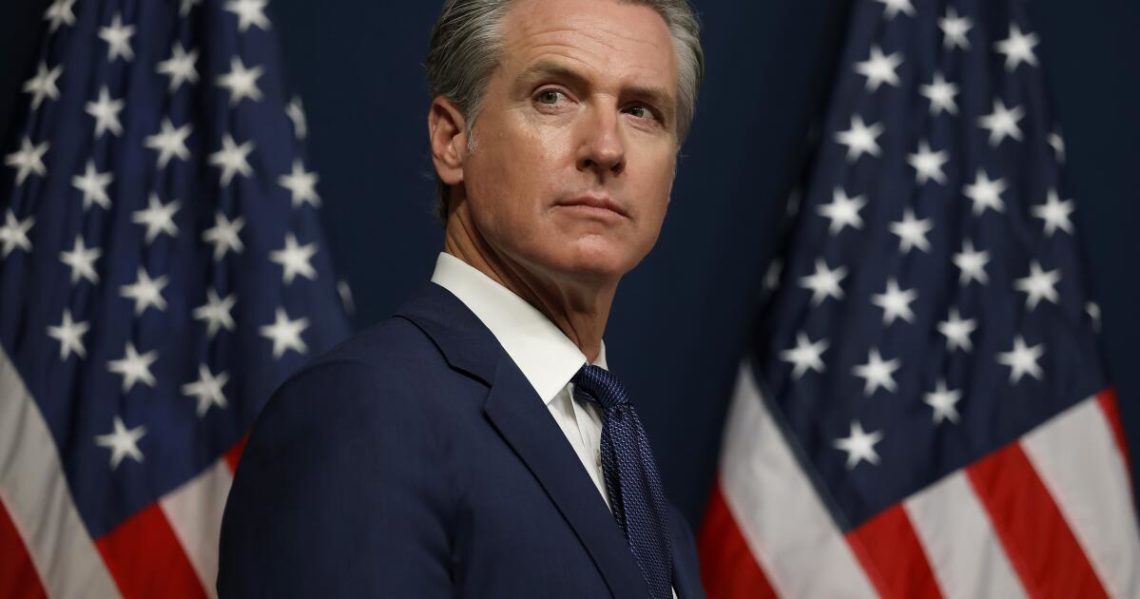SACRAMENTO — Gov. Gavin Newsom stepped to the microphone at the state Democratic headquarters in mid-August with the conviction of a man certain he was on the right side of history, bluntly saying California has a moral obligation to thwart President Trump’s attempt to tilt the balance of Congress.
Over the next 2½ months, Newsom became the public face of Proposition 50, a measure designed to help Democrats win control of the U.S. House of Representatives by temporarily redrawing California’s congressional districts.
Newsom took that leap despite tepid support for a gerrymandering measure in early polls.
With Tuesday’s election, the fate of Proposition 50 arrives at a pivotal moment for Newsom, who last week acknowledged publicly that he’s weighing a 2028 presidential run. The outcome will test not only his political instincts but also his ability to deliver on a measure that has national attention fixed squarely on him.
From the outset, Newsom paired his conviction with caution.
“I’m mindful of the hard work ahead,” Newsom said in August, shortly after lawmakers placed Proposition 50 on the ballot.
It was familiar territory for a governor who has built a career on high-stakes political bets. As San Francisco mayor, his decision to issue same-sex marriage licenses in 2004 made him a progressive icon. It also drew accusations he’d energized conservative turnout that year in the presidential election that ended with George W. Bush winning a second term.
As the state’s newly elected governor, he suspended the death penalty in 2019 despite voters having twice rejected measures to do so, calling it a costly and biased system that “fails to deliver justice” — a move that drew fury from law enforcement groups and victims’ families. His decision to take on Florida Gov. Ron DeSantis in a 2023 prime-time debate hosted by Sean Hannity on Fox News was intended to showcase his command of policy and political agility, but instead fell flat amid an onslaught of insults.
With Proposition 50, Newsom placed himself at the center of another potentially career-defining gamble before knowing how it would land. Ahead of Tuesday’s special election, polling suggests he may have played his cards right. Six out of 10 likely voters support Proposition 50, according to a survey by UC Berkeley’s Institute of Governmental Studies that was co-sponsored by The Times.
“You know, not everybody would have done it,” veteran Democratic strategist Gale Kaufman said. “He saw the risk and he took it.”
If approved by voters, the ballot measure would redraw California’s congressional maps to favor Democrats beginning with the 2026 midterm elections in hopes of discounting Republican efforts to gerrymander more seats for themselves. California introduced the measure in response to Trump and his political team leaning on Republican-led states to redraw their district lines to help Republicans retain control of the House.
The balance of power in the closely divided House will determine whether Trump can advance his agenda during his final two years in office — or face an emboldened Democratic majority that could move to challenge, or even investigate, his administration.
And while critics of the governor see a power-craving politician chasing headlines and influence, supporters say this is classic Newsom: confident, risk-tolerant and willing to stand alone when he believes he’s right. He faced intense backlash from his political allies when he had conservative personality Charlie Kirk as his inaugural guest on his podcast this year, on which Newsom said he believed it was “deeply unfair” for transgender athletes to compete in women’s sports. After Kirk was killed, Newsom regularly brought up that interview as a point of pride, noting the backlash he received from his own party over hosting a Trump ally.
In recent months Newsom struck a deal to stabilize struggling oil refineries, pushed cities to ban homeless encampments and proposed walking back healthcare coverage for undocumented immigrants — a series of moves that have tested his standing with progressives. Supporters say the moves show his pragmatic streak, while critics argue they reflect a shift to the center ahead of a possible presidential run.
“In so many ways, he is not a cautious politician,” said Jessica Levinson, a law professor at Loyola Law School. “His brand is big, bold decisions.”
With Proposition 50, Newsom has cast the redistricting counterpunch as a moral imperative, arguing that Democrat-led states must “fight fire with fire,” even if it means pausing a state independent redistricting process largely considered the gold standard. The measure upends a system Californians overwhelmingly endorsed to keep politics out of the map-drawing process.
Levinson said Newsom’s profile has been rising along with the polling numbers for Proposition 50 as he has booked national television shows like ‘The Late Show with Stephen Colbert” and appeared in an ad in favor of the ballot measure with former President Obama, Massachusetts Sen. Elizabeth Warren and other prominent Democrats that ran during the World Series.
“We are talking about Proposition 50 on a nationwide scale,” Levinson said. “And it’s really hard to talk about Proposition 50 without saying the words ‘Gov. Newsom of California spearheading the effort to pass.’”
California Republicans have called the effort misguided, arguing that the retaliatory response creates a slippery slope that would erode the independent redistricting process California voters have chosen twice at the ballot box.
“When you fight fire with fire, the whole world burns,” said California Rep. Kevin Kiley (R-Rocklin), whose district is among those that would be overhauled under Proposition 50. “Newsom is trying to claim that Texas did a bad gerrymandering, but what California is doing is a good gerrymander because somehow it’s canceling it out … I just think gerrymandering is wrong. It’s wrong in Texas and it’s wrong in California.”
Kiley said Newsom never has been one to shy away from national attention “and for pursing explicitly partisan goals.”
“He’s certainly used this as an opportunity to do both of those things,” Kiley said.
Out of the gate, the redistricting plan had lackluster support. Then came the flood of ads by proponents peppered with talking points about Trump rigging the election.
Supporters of Proposition 50 took in more than four times the amount that opponents raised in recent weeks, according to campaign finance reports filed with the state by the three main committees campaigning about the measure. Supporters of Proposition 50 raised so much money that Newsom told them “you can stop donating.”
Political analysts said the redistricting fight has given Newsom what every ambitious politician craves: a narrative. It’s allowed him to cast himself as a defender of democracy while reenergizing donors. That message sharpened when Trump administration officials said they’d monitor polling sites in several California counties at the state GOP’s request, prompting Newsom to accuse the Trump administration of “voter intimidation.”
Republican strategist Rob Stutzman said the campaign gave Newsom something he’d struggled to find: “an authentic confrontation” with Trump that resonates beyond California.
“And I think it’s worked well for him nationally,” Stutzman said. “I think it’s been great for him in some ways, regardless of what happens, but if it does lose, it’ll hurt the brand that he can win and there will be a lot of disgruntled donors.”
While Newsom has framed the measure as good for the country, Stutzman said it’s clear that Proposition 50 has been particularly good for the governor.
“He’s used it for his own purposes very, very effectively,” Stutzman said. “If he becomes the [presidential] nominee, you could look back and say this was an important part of him getting there.”
The post Gavin Newsom’s gamble on Prop. 50 may be his most calculated yet appeared first on Los Angeles Times.




